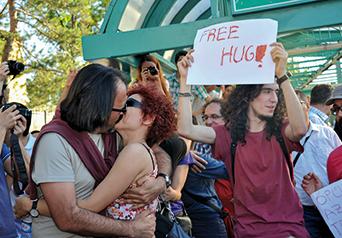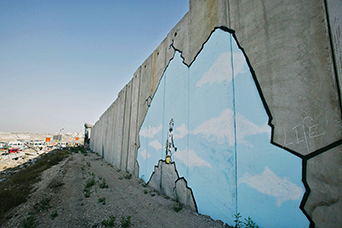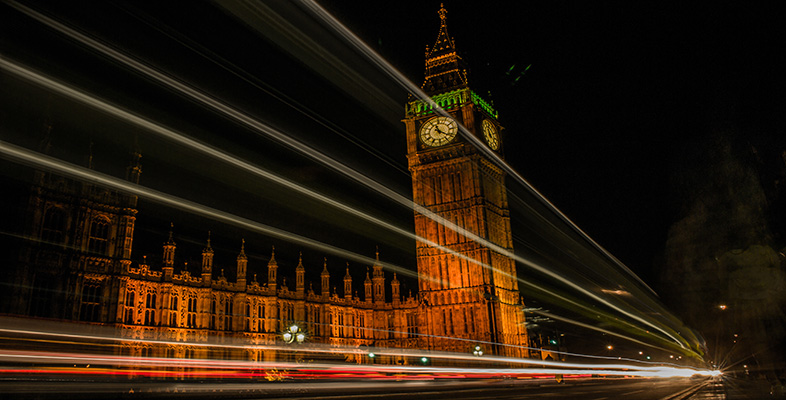2.2 Politics as context- and interpretation-dependent
We have come a long way from the narrow definition of politics as that which concerns the state to the definition of politics as a social and public activity, in the broadest sense of the terms ‘social’ and ‘public’. Where does this leave us? With politics defined so broadly that it has lost any meaning? With politics including everything but the kitchen sink? Is anything and everything political? Critics of broad definitions of politics argue that this is precisely the problem. But there might be a way of retaining a broader, more inclusive definition of politics without diluting ‘the political’ to the extent that it loses all meaning. One way of doing so is to argue that while not everything is necessarily political, it has the potential to be, depending on its context and interpretation. An example might be useful to clarify how such a definition of politics would work.
Let’s take the example of kissing, which is probably not something that immediately strikes us as political. Kissing your partner at home or giving your children a goodnight kiss is certainly not political. Yet in a different context, kissing could indeed be quite political. In 2013, two Moroccan teenagers were charged with ‘public indecency’ and although eventually acquitted, faced a possible five-year prison sentence after pictures of the couple kissing were posted on Facebook. While it doesn’t seem that the couple saw their kiss as political, the gesture was quickly politicised in the socially conservative kingdom. In protest of the charges, a dozen or so couples staged a public ‘kiss-in’ in front of the Moroccan parliament while others flooded Facebook with pictures of kissing couples. In 2014, public ‘kiss-ins’ were also organised in Turkey to protest the increasingly socially conservative orientation of the government, and in Russia to protest laws that would criminalise public displays of affection between gay and lesbian couples. Thus, while kissing is not in and of itself political (which might mitigate critics’ concern that in broad definitions of politics everything is political and so politics loses its meaning), it has the potential to be political, depending on the context.
In addition to context, we also need to attend to the question of interpretation – that is, whether an act is interpreted as political, either by the actor who performs it or by those who encounter it once it is projected into the world. While it might seem that the intention behind an action (that is, the intention to engage in politics, or to make a political statement through one’s action) is more important than its interpretation, often that is not actually the case. Actions can become politicised – they can become political, generate political debate and so on – without that being the intention of the actors involved. It doesn’t seem, for instance, that the two teenagers in the Moroccan kissing drama intended their kiss to be political, but it quickly became political. Such was also the case when two female athletes kissed on a podium in Russia in the lead-up to the Sochi Olympic Winter Games. The kiss was interpreted as a political statement in defiance of Russia’s anti-gay laws. Despite repeated insistence by the athletes that it was nothing of the sort, the act acquired a life of its own, sparking international debate and controversy. Thus, when it comes to the ‘political-ness’ of an action or situation, interpretation (and, of course, context) can matter more than intention.

Let’s take another example, that of graffiti. Is drawing or scribbling something on a wall political? Does it count as political activity? The simple answer is: it depends. It depends on which definition of politics we find most convincing and subscribe to. If we subscribe to definitions tending towards the narrow side of the spectrum – politics as that which concerns the state, or politics as conflict resolution – the production of graffiti might not qualify as a political activity. However, if we subscribe to definitions tending towards the broad side of the spectrum – politics as the exercise of power, or politics as a dialogue or public activity – graffiti might fit the bill.
As a form of expression, graffiti can be a challenge to social norms and laws that dictate what public spaces should look like and to the sanctity of private property. Thus, it can be political in the sense that it is a dialogue with (if not an outright challenge to) prevailing social norms and laws. What is more, in addition to being public in the narrow sense of the term (that is, an intervention into public space), graffiti can also be interpreted as public in the sense of being directed outward, into the world. Some graffiti is not only meant to be seen, but also meant to elicit a reaction, provoke a discussion or cause a debate. In short, it is meant to have an effect. Finally, the location or content of graffiti may also be political. Among the best-known contemporary graffiti artists is Banksy, a British street artist whose epigrams and images (as well as their locations) often contribute to some of the most salient social and political debates of our times.
Yet even if we subscribe to definitions of politics that tend toward the broader side of the spectrum, we might still want to avoid the blanket statement that all graffiti is inherently and necessarily political. Indeed, if nothing is inherently political, but rather has the potential to be political depending on context and interpretation, we need to analyse instances of graffiti in the same way that we analysed kissing in the previous example. We need to ascertain the circumstances under which graffiti can be political. The content of the graffiti, the message it is trying to convey, its location or the way it is being reacted to by those viewing or engaging with it can all help us decide whether or not it is political. Still, as you can probably very well imagine, we might not all come to the same conclusion.

As the previous examples illustrate, it seems possible to argue that politics is an activity that extends far beyond the state and its institutions without diluting it to the point that it becomes meaningless. We could indeed argue that while not everything is necessarily political, everything has the potential to be, depending on context and interpretation. Such a definition of politics enables us to transcend the halls of government and institutions of state, and multiply the stages on which politics is enacted. It enables us to recognise, and legitimate as political, acts and actors otherwise excluded from narrower definitions of politics. It also enables us to see conflict, and actions designed to provoke or to challenge the status quo, as legitimate and productive ways of doing politics. Thus, it broadens the definition of politics and multiplies the actors in political dramas, and the stages on which politics is enacted. Yet, through the proviso that not everything is necessarily political but rather has the potential to be, it broadens the political without diluting it to the extent that it loses all meaning.
